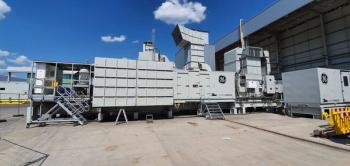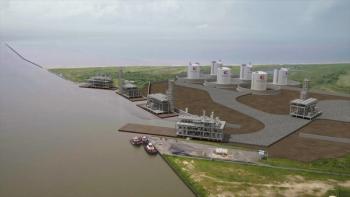
Sage Geosystems Wins Air Force Contract to Develop Power Plant
Unlike typical geothermal systems, geopressured geothermal systems (GGS) repurpose fracking technology to extract thermal energy from miles below the Earth’s surface.
The Department of the Air Force (DAF) awarded Sage Geosystems a contract to assess whether a GGS-equipped power plant can generate the clean energy required for on-base energy resilience. The grant is worth $1.9 million, with the company matching an additional $1.9 million for the demonstration project. In 2025, Sage will build the system at an off-site test well in Starr County, TX.
“The wing is very excited to execute the first GGS in the Air Force,” said Lt Col Christian Campbell, 147th Civil Engineer Squadron Commander. “To become 100 percent resilient and carbon-free is an amazing feat. For the 147th Attack Wing to be the baseline for Sage Geosystems to showcase this technology to the DoD makes us proud. It has been a pleasure working with Sage and their design team; we feel this is the launch pad of helping not only the DoD but many other applications throughout global markets.”
Unlike traditional geothermal techniques that leverage rare geological formations with hot water and steam, GGS repurposes fracking technology to extract thermal energy from miles below the Earth’s surface. A full-scale project at Ellington Field Joint Air Reserve Base in Houston may lead to clean power-producing plants that satisfy the energy needs of DAF installations. This is the third geothermal pilot project initiated by DAF in 2024, with more sites in consideration.
“This initial contract is a step forward in the Air Force’s push for energy resilience,” said Kirk Phillips, Director of the Air Force Office of Energy Assurance. “This project will improve Ellington Field’s ability to maintain operations during electrical grid outages and be completely self-sufficient for their energy needs. This project, and the future DAF projects that it paves the way for, will help to assure that our national security needs are met by our installations during critical emergencies.”
GGS also demonstrates potential in the civilian sector by addressing the intermittency of solar and wind energy generation, as well as minimizing land use. A smaller footprint allows the technology to be sited in urban areas without relying on expensive transmission line buildout.
“We would build geothermal energy power plants at every Air Force installation if we could,” said Phillips. “Geothermal power is renewable, it is secure, it is reliable, it is cost-effective and the systems to produce power from heat are well-understood.”
Sage Geosystems News
In August 2024,
GGS will leverage Sage’s technology to store energy for 6-to-10-hour durations with an RTE of 70-75% and water losses less than 2%. The energy storage system will be paired with renewable energy, providing baseload, dispatchable power to the electric grid. The EarthStore facility, when coupled with solar power, enables continuous electricity generation at a blended levelized cost of energy under $0.10/kWh. Sage will apply for two drilling permits in Texas: the first in Atascosa County for GGS and the second in Starr County, in proximity to Sage’s existing test well.
Newsletter
Power your knowledge with the latest in turbine technology, engineering advances, and energy solutions—subscribe to Turbomachinery International today.




